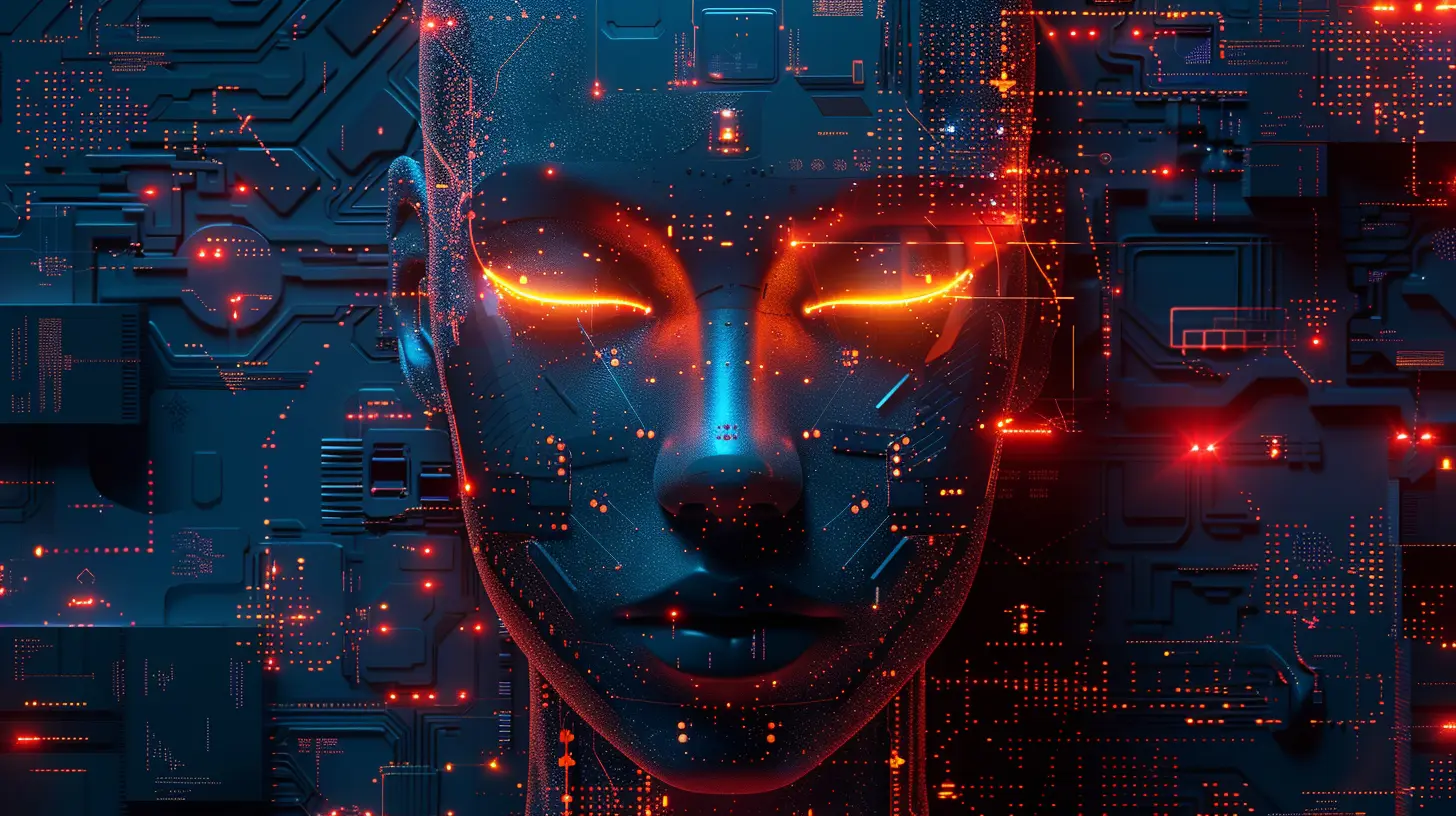How AI is Revolutionizing Cloud Security
26 April 2025
Let's face it – today's digital world is a bit like the Wild West. Everyone's out there, roaming the vast plains of the internet, and cloud technology has become the trusty horse carrying businesses and individuals through this frontier. But with all the incredible benefits of cloud computing comes a significant risk: security threats. From data breaches to sophisticated cyber-attacks, it's a battleground out there. And here's the kicker – the bad guys are getting smarter.
So, what’s the good news? Artificial Intelligence (AI) is stepping in as the sheriff, revolutionizing cloud security in ways we couldn’t have imagined just a few years ago. If you're wondering how AI is playing a role in safeguarding our cloud environments, you're in the right place. Let’s dive in!

The Cloud: Convenience Meets Vulnerability
Before we jump into how AI is changing the game, let’s set the stage. The cloud is, without a doubt, one of the greatest innovations of the 21st century. It offers flexibility, scalability, and cost-effectiveness. Need to store data? The cloud’s got you. Want to run applications from anywhere? Cloud computing is your answer. But this convenience comes with a dark side.Cybercriminals see the cloud as a treasure trove of valuable information. And because cloud environments are accessible from nearly anywhere, it opens up an endless range of attack possibilities. While traditional security systems have done a decent job of keeping threats at bay, they simply can’t keep up with the ever-changing landscape of cybercrime.
This is where AI steps in, like a super-smart detective that never sleeps.

How AI is Changing the Face of Cloud Security
1. Proactive Threat Detection
Imagine having a security guard who not only reacts when a thief breaks in but can predict when a break-in might happen and stop it before it even starts. That’s AI-powered threat detection in a nutshell.Most traditional security systems are reactive – they respond after a threat is detected. AI, on the other hand, is proactive. It constantly monitors cloud environments, learning from patterns and behaviors to identify potential threats before they escalate. AI can detect anomalies in real-time, flagging suspicious activities that might go unnoticed by human eyes or even traditional software.
For example, if an employee suddenly starts downloading massive amounts of sensitive data at 3 AM – something that’s out of the norm for their behavior – AI can catch it and raise an alarm.
2. Machine Learning: A Smarter Defense System
At the heart of AI’s power in cloud security is Machine Learning (ML). For those who may not know, ML is a subset of AI where systems learn from data, improving their performance over time without being explicitly programmed.In the context of cloud security, ML algorithms can sift through massive amounts of data, learning what’s normal and what isn’t. Over time, these systems become more adept at recognizing intricate patterns in user behavior, network traffic, and data usage.
Because ML systems get smarter with more data, they can adapt to new threats much faster than traditional security systems. It's like having a guard dog that grows more intelligent and sharper with every encounter.
3. Automated Incident Response
When a threat is detected, time is of the essence. The longer it takes to respond, the more damage could be done. AI is speeding up incident response by automating much of the process. Once a threat is identified, AI can automatically take actions like isolating the affected system, blocking suspicious IP addresses, or even initiating a full shutdown of certain functions to prevent further damage.This kind of automation drastically reduces the response time – from minutes or hours to mere seconds. In the fast-paced world of cyber-attacks, every second counts.
4. Enhanced Identity and Access Management (IAM)
One of the biggest challenges in cloud security is managing who has access to what. Employees come and go, roles change, and managing access rights can become a logistical nightmare. If not managed properly, unauthorized access can open the door to a wide range of security threats.AI enhances Identity and Access Management (IAM) by automating the process. It can continuously monitor user access patterns, ensuring that only the right people have access to the right resources at the right time. If someone tries to access something they shouldn’t, AI can detect the unusual behavior and block it.
Picture this: You’re a bank teller, and suddenly you’re trying to access the vault. AI would recognize that this isn’t part of your usual job activities and could prevent access or trigger an alert.
5. Predictive Analytics for Future Threats
Wouldn’t it be great if you had a crystal ball to predict future cyber-attacks? Well, AI isn’t quite a crystal ball, but it’s pretty close when it comes to predictive analytics. Using historical data, AI can forecast potential vulnerabilities and anticipate where future attacks may occur.For instance, if certain types of ransomware attacks have been on the rise in specific industries, AI can predict that similar attacks may target your industry next. Armed with this information, businesses can strengthen their defenses before the attack happens.
It’s like knowing there’s a storm coming and boarding up your windows ahead of time.
6. Natural Language Processing (NLP) for Threat Intelligence
Another way AI is making waves in cloud security is through Natural Language Processing (NLP) – the technology that allows computers to understand and interpret human language. By analyzing text from various sources (like security reports, online forums, and dark web chatter), NLP can gather valuable threat intelligence.AI-powered NLP tools can process vast amounts of unstructured data, identifying trends and warning signs of emerging threats. This gives security teams an edge in staying one step ahead of cybercriminals.
Think of it as having a spy that can listen in on conversations and warn you of impending danger before anyone else knows about it.
7. Data Encryption and AI: A Dynamic Duo
Data encryption is one of the foundational pillars of cloud security. But even the best encryption techniques can be vulnerable if not managed properly. AI can enhance encryption by dynamically adjusting security protocols based on the sensitivity of the data and the threat landscape.For example, AI could automatically increase encryption levels for sensitive data when a potential threat is detected, adding an extra layer of security just when it's needed most.
8. AI-Powered Security Audits
Think of a traditional security audit as a yearly check-up for your cloud infrastructure. The problem? Cyber threats don’t wait for annual audits. They’re more like sneaky burglars who look for any crack in your defense.AI-powered security audits, however, never stop. These systems constantly scan for vulnerabilities, ensuring that your cloud environment is always secure. If a new vulnerability is discovered, AI can alert your team in real-time so that it can be patched immediately.
9. Reducing Human Error
Let’s be real for a second – humans make mistakes. Whether it’s using weak passwords, misconfiguring cloud servers, or accidentally sharing sensitive data, human error is one of the biggest causes of security breaches. AI can help minimize these risks by automating tasks that are prone to human error and offering real-time guidance to users.For example, AI can suggest stronger passwords, flag potential configuration issues, and provide ongoing training to employees about best security practices. It’s like having a security coach guiding you every step of the way.

The Future of AI in Cloud Security
So, what does the future hold? As AI continues to evolve, it will undoubtedly play an even more significant role in cloud security. We can expect AI systems to become even more autonomous, taking on more complex tasks without human intervention.In the future, AI may be able to not only detect and prevent attacks but also trace them back to their source and potentially neutralize threats before they even reach the cloud environment. It's an exciting time in the world of cybersecurity, and the possibilities are endless.
The Balancing Act: AI and Privacy
Of course, with all this talk about AI monitoring and analyzing cloud environments, there's a question that naturally arises: What about privacy? While AI can provide incredible security benefits, it also raises concerns about how much data it’s collecting and analyzing. Striking the right balance between security and privacy will be critical as we move forward.
Conclusion
There’s no doubt about it – AI is revolutionizing cloud security. From proactive threat detection to automated incident response, machine learning, and predictive analytics, AI is offering a level of protection that was previously unimaginable. As cyber threats continue to evolve, AI will be essential in keeping cloud environments secure.Cloud security is no longer just about building walls around your data. It's about having a smart, evolving, and adaptive defense system that can outthink, outmaneuver, and outsmart the threats. And the best part? AI is only getting better with time.
all images in this post were generated using AI tools
Category:
Cloud SecurityAuthor:

Gabriel Sullivan
Discussion
rate this article
8 comments
Theodore Hamilton
This article beautifully highlights the transformative impact of AI on cloud security! As someone who relies on cloud services daily, it’s reassuring to see how these advancements enhance protection. Excited to see what the future holds for AI and security! Great read!
May 10, 2025 at 6:18 PM

Gabriel Sullivan
Thank you for your kind words! I'm glad you found the article insightful. The future of AI in cloud security is indeed promising!
Naomi Mahoney
AI is transforming cloud security by enhancing threat detection and response times. Its ability to analyze vast amounts of data in real-time allows for proactive measures against potential breaches. As cyber threats evolve, leveraging AI-driven solutions will be crucial for maintaining robust security in cloud environments.
May 6, 2025 at 4:09 AM

Gabriel Sullivan
Absolutely! AI's real-time data analysis significantly boosts threat detection and response, making it essential for robust cloud security as cyber threats continue to evolve.
Jessica Kirkpatrick
Great insights! It's fascinating to see how AI is transforming cloud security. I appreciate the depth of analysis and look forward to seeing how these advancements will shape the future.
May 5, 2025 at 8:57 PM

Gabriel Sullivan
Thank you! I'm glad you found the insights valuable. Exciting times ahead for AI and cloud security!
Henry Cain
AI in cloud security? Finally, a digital bodyguard that actually works! Just imagine telling your data, 'Don’t worry, I've got an AI guarding you!' It’s like having a virtual bouncer who only kicks out the shady characters. Cheers to safe clouds and fewer data hangovers!
May 5, 2025 at 10:28 AM

Gabriel Sullivan
Absolutely! AI is like a vigilant guard for your data, ensuring safety and keeping threats at bay. Cheers to advancing cloud security!
Wyatt McCracken
AI enhances cloud security by automating threat detection, improving response times, and enabling adaptive security measures for evolving threats.
May 2, 2025 at 6:56 PM

Gabriel Sullivan
Thank you for your insights! AI's role in automating threat detection and enhancing response times is indeed crucial for adapting to ever-evolving security challenges in the cloud.
Helen McNeil
This article effectively highlights the transformative role of AI in enhancing cloud security. While AI offers promising advancements in threat detection and response, it’s crucial to address potential challenges, such as privacy concerns and the need for ongoing human oversight. Great insights!
May 2, 2025 at 1:01 PM

Gabriel Sullivan
Thank you for your thoughtful comment! I'm glad you found the insights valuable and agree on the importance of addressing privacy concerns and ensuring human oversight in AI-driven security.
Jackson Hughes
Absolutely thrilled to see how AI is transforming cloud security! 🌟 The innovative solutions emerging are not only enhancing protection but also making it more efficient. Exciting times ahead for tech enthusiasts as we embrace a safer digital future! Keep shining, AI! 🚀✨
April 30, 2025 at 3:09 AM

Gabriel Sullivan
Thank you for your enthusiasm! We're indeed witnessing transformative changes in cloud security thanks to AI. Exciting times ahead! 🚀✨
Graham Hubbard
This article beautifully captures the transformative impact of AI on cloud security—truly a game changer for all!
April 28, 2025 at 10:46 AM

Gabriel Sullivan
Thank you! I'm glad you found the article insightful. AI is indeed reshaping cloud security in remarkable ways!
MORE POSTS

Cybersecurity in Cloud Computing: What You Should Be Aware Of

Exploring the Ethical Implications of Augmented Reality

The Role of AR Glasses in Emergency Response

How Autonomous Robots are Changing the Consumer Gadget Space

Oculus Quest vs. PlayStation VR: Best VR Headset for Gamers

The Most Forward-Thinking Tech Conferences You Must Attend